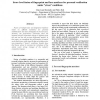Free Online Productivity Tools
i2Speak
i2Symbol
i2OCR
iTex2Img
iWeb2Print
iWeb2Shot
i2Type
iPdf2Split
iPdf2Merge
i2Bopomofo
i2Arabic
i2Style
i2Image
i2PDF
iLatex2Rtf
Sci2ools
ICIAP
2007
ACM
2007
ACM
Score-level fusion of fingerprint and face matchers for personal verification under "stress" conditions
Fusion of multiple face and fingerprint matchers based on different biometrics for personal authentication has been investigated in the last years. However, the performance achievable when the expected subject cooperation degree is different from the real one has not yet been sufficiently studied. In this paper, we investigate the performance of several score-level fusion rules when the test set is taken under non-cooperative (“stress”) conditions. Results show that fusion allows to increase the robustness of the system under strong changes of the subject’s cooperation degree.
Cooperation Degree | ICIAP 2007 | Image Processing | Score-level Fusion Rules | Subject Cooperation Degree |
| Added | 08 Jun 2010 |
| Updated | 08 Jun 2010 |
| Type | Conference |
| Year | 2007 |
| Where | ICIAP |
| Authors | Gian Luca Marcialis, Fabio Roli |
Comments (0)

